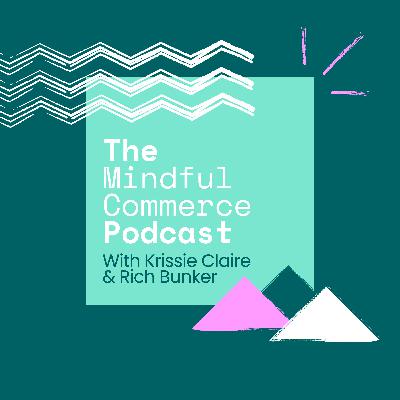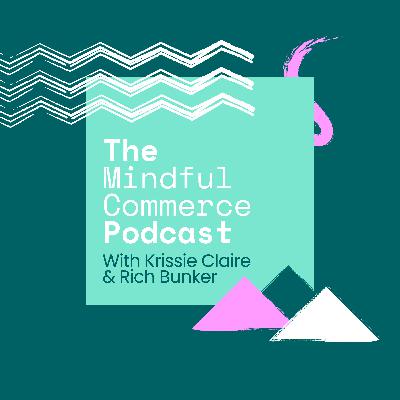#13 What is The Circular Economy and How Can Online Retailers Get Involved?
Description
Find us:
- Head to our community page to register & join the MindfulCommerce community as an expert, brand or merchant
- Instagram: @mindfulcommerce
- Facebook @MindfulCommerce
- Contact Us - info@mindfulcommerce.io
Where to find One Circular World:
Where to find Claire Potter:
Claire Potter - Email: claire@clairepotterdesign.com
Where to find Recurate:
Where to find Adam Siegel:
Adam Siegel - Email: adam@recurate.com
Links Mentioned in Episode:
University of Sussex - Product Design
Global Ghost Gear Initiative (GGGI)
Surfers Against Sewage
Patagonia
Patagonia - "Don't Buy This Jacket" Ad
Loop
Fairphone
Mud Jeans
Rent The Runway
Cradle to Cradle - book
Ellen MacArthur Foundation
LimeLoop
Peak Design
La Ligne
Re-Ligne - La Ligne's Resale Marketplace
Brass Clothing
Jackalo
Totem Brand Co
Lululemon Resale Launch
Shownotes:
Krissie Leyland 0:00
Hello, and welcome to The MindfulCommerce Podcast, a place where we talk to ecommerce brands and service providers and developers who care about protecting our planet. I'm Krissie!
Rich Bunker 0:11
I'm Rich, and we're your hosts. This podcast is an extension of the MindfulCommerce Community.
Krissie Leyland 0:18
The MindfulCommerce Community is a safe place for ecommerce brands and experts to connect, collaborate and explore opportunities to work together to unleash the power of ecommerce as a force for good.
Rich Bunker 0:30
You can join by going to mindfulcommerce.io and clicking "Community". See you there!
Krissie Leyland 0:35
Hello, this is the second episode of our series where we upload our special panel events with our ecommerce and sustainability experts. This event is all about the circular economy: why ecommerce brands should get involved and how can they go about it in the easiest and most efficient way possible with our incredible guest speakers Claire from One Circular World and Adam from Recurate.
Claire is from One Circular World, which is an educational resource exploring the circular economy – not just for business managers, politicians or policymakers, but for all of us, including those in the ecommerce world. And Adam is from Recurate. Recurate enables a beautifully integrated resale marketplace directly on ecommerce stores. So this means you can very easily integrate a secondhand store directly on your website, which is great for your brand and great for the planet. If you're a regular listener, follow us on social media or have gone through our incredible Sustainability Framework, you'll know that I talk about Recurate a lot, so this was a long time coming. So thank you, Adam and thank you Claire, so so much for taking the time to deliver your knowledge to us. Thank you to those who attended the event live and thank you lovely listeners for being here with us on the podcast. So if you enjoy this event, you'll love being in our community. We are introducing live training events in our community group, so it's a great time to get involved if you want to learn about growing your ecommerce business in the most sustainable and positively impactful way. You can join the community for free by going to mindfulcommerce.io and clicking on "Community". I'll also link to the direct link to join on the show notes. Okay, let's get right into it and let's go over to the event. Enjoy.
Claire Potter 2:50
Good afternoon, everybody. Hi! Thank you so much for having me. We're gonna be talking about circular economy, and what can basically people do with it, particularly from a commerce perspective. Firstly, I'm going to give you a quick, quick introduction to me. So like many of us, I wear many different hats. I run a design studio, I identify as a designer, I trained as an interior architect, and I specialized in eco sustainable ways of working that eventually became a circular economy way of thinking. That was founded in 2008.
Also I'm a lecturer at the University of Sussex, and I'm the head of the product design course at University of Sussex. Mostly because of my interference, I suppose we've become quite a sort of a hub for circular economy learning with regards to products, and how it can become an integral part of the educational process because our product designers are making all the stuff that we have in the world. So that's another day job.
As far as volunteer stuff, I'm actually the working group coordinator for the Global Ghost Gear Initiative, which is a bit of a mouthful, but basically this is end of life fishing nets, stuff that's been abandoned, lost or discarded. And this is a global thing. So we've got members of the GGGI that are really little organizations like me and my design studio, all the way through to governments. So it's really far reaching and an amazing set of people doing incredible stuff globally. On a more load local scale... I'm based usually down in Brighton, in Lincolnshire. I'm actually based down in Brighton & Hove and I'm one of the regional reps for Surfers Against Sewage, which again is a volunteer role and I'm the plastics person. As I say: disclaimer, I don't surf but I can snowboard and I know nothing about poo, but I know a lot about plastic. So that's basically the stuff that I do for Surfers Against Sewage: leading beach cleans, educating people about plastic, in particular marine plastic, and that's been my specialist nerd niche, as I call it for the last year 12 years.
Then everything sort of came together with One Circular World, which is the hats that I'm wearing today and I'm going to talk to you a little about that in a second. But how does all of that knit together: it all knits together because of design – because everything we have in the world is designed from our systems to our stuff. The way that we behave has been designed and influenced in multitude of different ways. A lot of that can be influenced in a good way, I think through behavior change, circular economy thinking, and the value of the products and the materials we have in our lives, regardless of whether there's something that is relatively short term or something that lasts for a very, very long time. So basically, I deal with people and I deal with stuff. That is the sort of the top line of everything I do.
I know a lot of you have probably joined this and know a lot about the circular economy but just in case you're not too sure about the terminology, this is the kind of way I explain it to most people: It's basically how the natural world works. So if you think about it, you can have a leaf, that leaf will get eaten by Caterpillar, the caterpillar gets eaten by the bird, the birds sadly dies, that bird falls to the floor, it composts, and then it ends up nourishing the earth itself and allowing a tree to grow more leaves, which can then be eaten by more caterpillars. So you can see here that even though I've put this in a line, it's a system that works in a circle, or a loop in a way, because it's a little bit more complex than that. So whatever is at the end will eventually go back to the beginning. But we don't work in that way.
We're the only species on the planet that creates any kind of waste, which is quite staggering. So we work in this linear way: we dig things up, we make something, we sell, we buy things and then it gets to the end of its life, regardless of how long that life is. It mostly ends up in landfill, or ends up in incineration. Sometimes it gets recycled, but it works in a linear way. Not all of our systems work in that cyclical way, just like nature does. So if in doubt, when you're thinking about the circular economy, because it can be pretty complicated, we're going to dial into a few bits of that in a second, think about how nature works. Does nature do this? If it doesn't, then it probably isn't part of a circular system. So another way of calling it is "cradle at the beginning to the grave at the end": it's a linear lifeline.
Now I have a bit of an issue with the word sustainable but it is genuine












